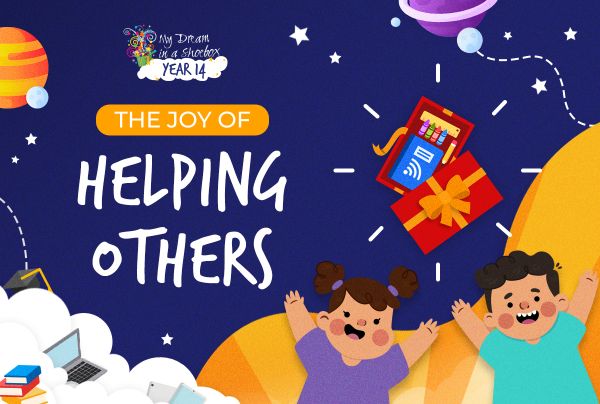The Joy of Helping Others Essay

The joy of helping others is underrated. It is that unique happiness that you feel when you share yourself with other people. In a world that often seems chaotic and fast-paced, there’s a simple yet profound joy in slowing down and extending a helping hand to those in need.
Today, let’s delve into the wonderful realm of the joy of helping others, exploring the significance, benefits, and science behind that warm feeling we get when we make a positive impact on someone’s life.
My Reflection on Helping Others
I remember feeling this when I was in my first My Dream in a Shoebox distribution activity in Christ the King Parish, one of our beneficiaries; I was on one of the teams helping with the games and I struck up a conversation with one of the kids on my team. He was super engaging and I think he was in love with the tattoo of a rhinoceros on my arm.
When the event ended, he waved goodbye to me, Kuya Rhino. Then there was me, smiling uncontrollably. Tired, a little bit hungry, but feeling fulfilled. It was one of the few times in my life that I felt genuinely happy.
But what gives? Why do we feel happy when we help other people?
Why Does Giving to Others Make Me Happy?
The joy of helping others is innate and rooted in our evolutionary history as social beings. Whether through a simple act of kindness or a significant contribution, we tap into our fundamental desire to connect and uplift others. In a world often focused on individual achievement, the joy of helping others is a refreshing reminder that our true fulfillment lies in the well-being of those around us.
The happiness derived from giving goes beyond fleeting emotions; it’s about the profound satisfaction of making a positive impact. Whether big or small, our actions create a ripple effect of positivity, providing purpose and fulfillment in a sometimes overwhelming world. Through giving, we discover the strength of human connection,
Imagine you’re at work, and a colleague is feeling overwhelmed with an upcoming project. Instead of focusing solely on your tasks, you take a moment to offer assistance. You share your expertise, help brainstorm ideas, and ease the workload.
In this scenario, the happiness derived from giving isn’t about a tangible gift; it’s in the sense of collaboration and support. As the project progresses successfully, the joy isn’t just a result of personal achievement but of knowing you made someone else’s workday a bit lighter. Happiness comes from the interconnectedness of a team, where each person’s contribution adds to the collective success, fostering a positive work environment.
A Historical Context To Why We Feel Joy Helping Others
In his field notes, cultural anthropologist F. Landa Jocano talks about a concept called pakikisama – meaning to be concerned about, to be supportive of, and to concede to the needs of the public. He argues that Filipino society is founded on the idea that the community’s needs are supreme over the individual. This is in stark contrast to the individualism of our Western counterparts.

You find evidence of this in how Filipino society works. Bayanihan, where neighbors come together to move entire houses (back then you could do it because houses were relatively lightweight), is a prime example of this phenomenon.
This was also evident when Typhoon Haiyan devastated the southern and central regions of the Philippines. It was among the most powerful storms we had experienced in years, devastating Tacloban and huge swathes of Western Visayas. But amidst the carnage left by the storm, you find stories of hope.
One example we experienced on MDIAS is Father Garix Abusejo, whose tiny Parish (a section of a church district) in Guiuan Samar was wiped out by Haiyan. He traveled by motorcycle to Manila, taking days to reach us. He begged churches and communities to come to help his little town. And help they did. Donation drives were organized. Trucks were hired. And these communities stood up to give life-saving food and water to the citizens of Guiuan.
There are a hundred thousand and one stories of this happening after the storm. And millions more when you take into account the countless disasters that visit our country.
It tells us one thing – we help each other when times are tough.
A Physiological Perspective To Why We Feel Joy Helping Others
But even human beings, in general, are built to help each other. That happiness you feel when you share and help someone is a chemical in your brain—-Oxytocin. When you share, when you give, when you help someone stand up on their own two feet, the brain responds by pumping out oxytocin in our bloodstream. It makes you feel elated and gives you a sense of belongingness to someone.
It is somewhat appropriate that oxytocin is linked to childbirth and breastfeeding. You feel good when you help and the same hormone is released in childbirth – somehow telling us that we live in a world worth living in.
I guess we evolved this way for humanity to survive, you need to feel good about helping people. Helping others is what makes us human more than anything else.
Why is Helping Others So Important?
In the grand scheme of human life, acts of kindness and compassion create a story that goes beyond individual experiences. Helping others isn’t just something we should do because it’s right; it’s what holds societies together. Our connection as a species becomes clear when we see that one person’s well-being is connected to everyone else’s.
Picture a world where everyone is genuinely working to make things better for others. It might sound like an idealistic dream, but the core of it is realizing that when we help others, we’re adding to the overall happiness and success of everyone.
What are the benefits of giving to others?
1. Improved Mental Well-being:
One significant benefit of helping others is the positive impact it can have on your mental well-being.
Engaging in acts of kindness and offering assistance to others has been linked to increased feelings of happiness and reduced stress levels. When you help someone, it often leads to a sense of accomplishment which then triggers the release of neurotransmitters like serotonin, dopamine, and what we mentioned earlier, oxytocin in the brain.
These “feel-good” chemicals contribute to an overall improved mood and can even act as natural antidepressants.
2. Connection:
Understanding that your actions have positively impacted someone else’s life will give you purpose and satisfaction. In simpler terms, helping others not only boosts your mood but also makes you feel more connected and fulfilled in your relationships with those around you.
3. Positive Outlook in Life:
Over time, consistently engaging in acts of kindness can contribute to a more positive outlook on life and may even play a role in preventing or alleviating symptoms of anxiety and depression.
What I Learned From Helping Others?
At the end of the day, whether it is our own culture telling us to do it or our bodies evolving that way, we just become happy when we help.
And we all know we need a little happiness in our lives now more than ever. The world will always be dark and dreary. We beat ourselves up not thinking we have a purpose in this life but we do. Culture tells us this. Our bodies tell us this.
Do You Want to Feel Happy Giving Help To Others?
Do yourself a favor today. You deserve to be happy. Find happiness for yourself when you create brighter realities and build bigger dreams. Pledge today and donate through our website at My Dream in a Shoebox.

 facebook.com/mydreaminashoebox
facebook.com/mydreaminashoebox instagram.com/mydreaminashoebox
instagram.com/mydreaminashoebox